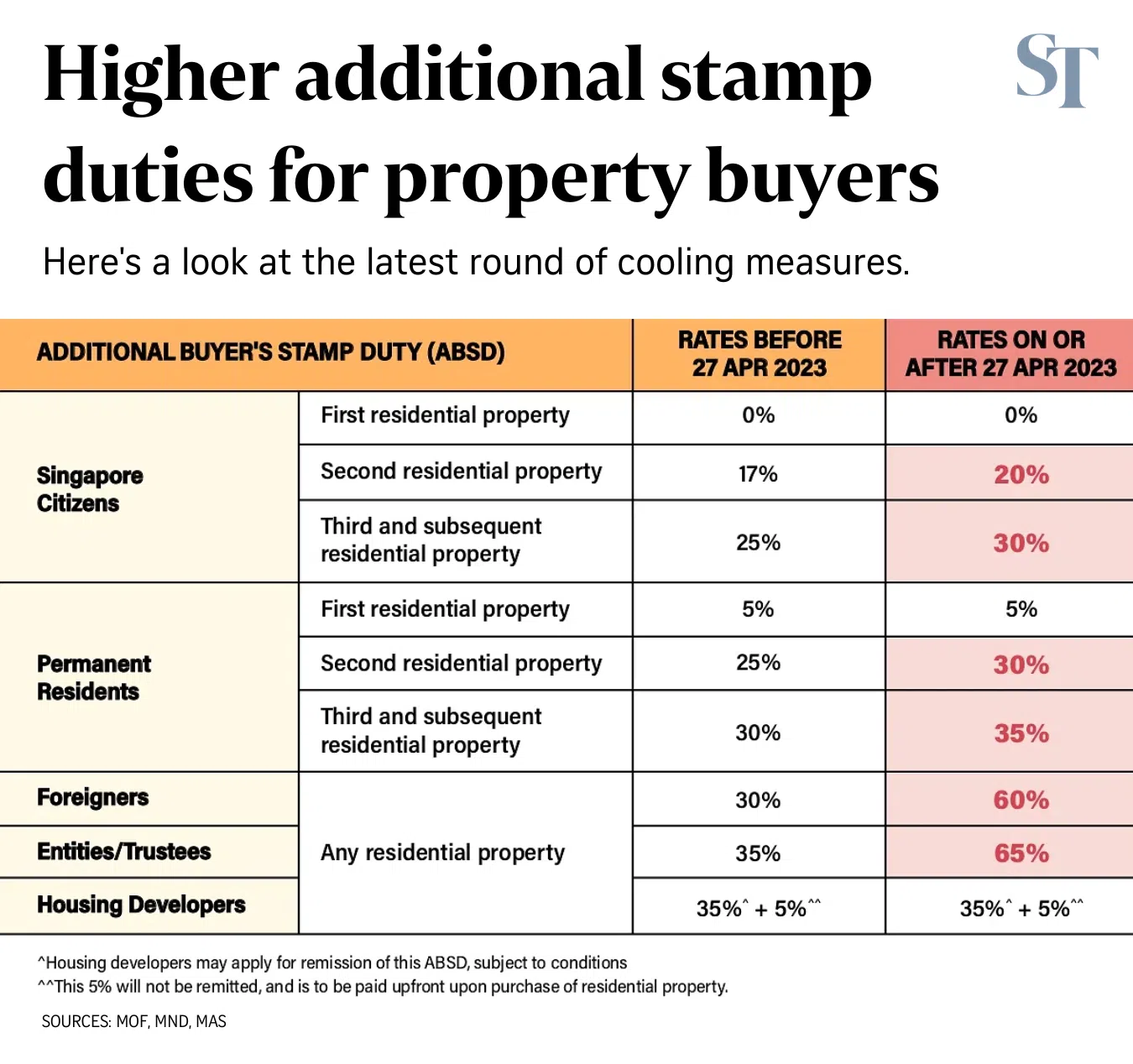ABSD raised to pre-emptively dampen property investment demand: Desmond Lee
Sign up now: Get ST's newsletters delivered to your inbox
ThenewroundofincreasesintheAdditionalBuyersStampDutyareaimedatprioritisingSingaporeanswhoarebuyinghomes
Follow topic:
SINGAPORE - The latest round of cooling measures was aimed at preventing property prices from being pushed up by investors and prioritising Singaporeans buying homes for owner-occupation, said National Development Minister Desmond Lee on Thursday.
The Government imposed the latest round of increases in additional buyer’s stamp duty (ABSD) rates
Mr Lee also flagged the latest warning by the Monetary Authority of Singapore (MAS) that Singapore’s growth prospects could be affected
The authorities announced late on Wednesday that the ABSD rate for foreigners buying any residential property in Singapore will be raised from 30 per cent to 60 per cent.
For Singapore citizens, the rate will be raised from 17 per cent to 20 per cent for those buying their second residential property, and from 25 per cent to 30 per cent for those getting their third and subsequent property.
Singapore permanent residents (PRs) buying their second residential property will see the rate rise from 25 per cent to 30 per cent, and from 30 per cent to 35 per cent for third and subsequent properties.
Private home prices have jumped 3.3 per cent in the first quarter of 2023, after rising 0.4 per cent in the fourth quarter of 2022.
Foreign interest in Singapore residential property
“Over successive rounds of property-related measures, you’ve seen foreign investment, as a proportion of private property transactions, fall from 20 per cent in 2011 to about 3 per cent to 4 per cent over the last few years. The average from 2017 to 2019 was around 6 per cent,” said Mr Lee.
But foreigners are again getting interested in the Singapore property market and accounted for 7 per cent of all transactions in the first quarter of 2023, said Mr Lee.
“Therefore, if we don’t take early pre-emptive measures, we may see investment numbers, both by locals and by foreigners, grow, and that will add stress to Singaporeans who are looking to buy for owner-occupation,” he said.
Asked why the rate hike for foreigners was much larger than that for locals, Mr Lee said the Government had to “calibrate the ABSD rate in order to have an effective dampener on investments from abroad”.
He added that as Singaporeans and PRs are “very sensitive to changes in ABSD”, the increase of 3 percentage points to 5 percentage points in rates should be sufficient to dampen investment interest.
Based on 2022 data, the ABSD rate hikes will affect about 10 per cent of all private residential property transactions – involving foreign investors as well as those buying their second and subsequent property.
“You may say it’s just 10 per cent, but actually you want to make sure that this does not grow significantly,” said Mr Lee.
“We are taking calibrated steps for a property market that remains resilient at a time of significant economic uncertainty and a high interest rate environment. It is quite different from after the global financial crisis situation where you had a V-shaped economic recovery and a very bullish property market and when interest rates were at historic lows.”
He said the pandemic had also had an impact on construction and supply. Rising demand and tight supply could have acted as a “double-whammy”, he added.
This is the fourth time that ABSD rates have been raised since the measure was first introduced in December 2011. Rates were hiked in December 2021
The last two rounds of property cooling measures in December 2021 and September 2022
Mr Lee attributed the strong local demand to pandemic-related construction delays, and more buyers wanting larger apartments.
“This is on top of the socioeconomic development of Singapore, as you see more people, more nuclear families, more individuals moving out or seniors living on their own,” he added.

Asked whether the latest ABSD rate will affect the Housing Board resale market, Mr Lee said this market “has seen some moderation”.
“But it is not just about demand-side measures like ABSD, it is also about supply in both the private residential market, as well as the HDB market. There has been a significant increase in supply,” he said.
On rentals, Mr Lee noted that prior to the pandemic, rental demand growth from locals has been low.
“During the pandemic, you see foreigners falling out of the picture, but the increase in rental demand from Singapore residents has been very significant, in the four-digit figures.
“With supply coming on market, and more Singaporeans exiting (renting), we expect pressures on the rental market to moderate later this year, into next year.”
But he said the authorities would keep a close eye on the rental market as it does impact Singaporeans and those working in Singapore companies.
Asked if ABSD rates could drop, Mr Lee said: “Over the last one, two years, you’ve seen both HDB and private property go up… and we’ve had to take a series of measures both on the supply side (and) on the demand side to make sure that we achieve stability, and that the markets don’t run ahead of economic fundamentals.
“As to whether any of these measures can be unwound or relaxed or maybe even tightened, that is something that we keep a very close eye on,” he added.


